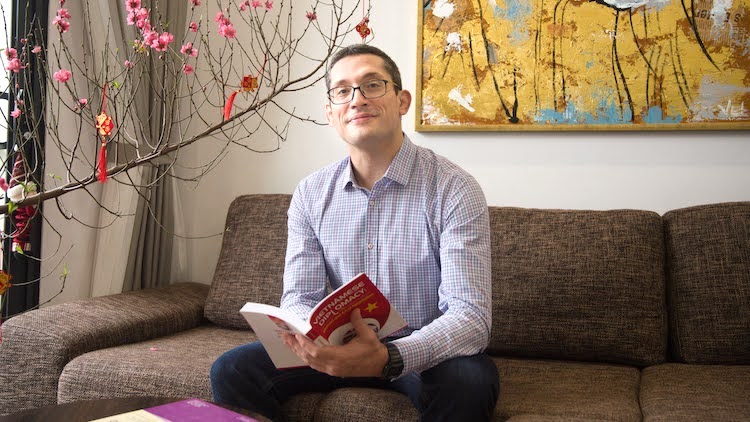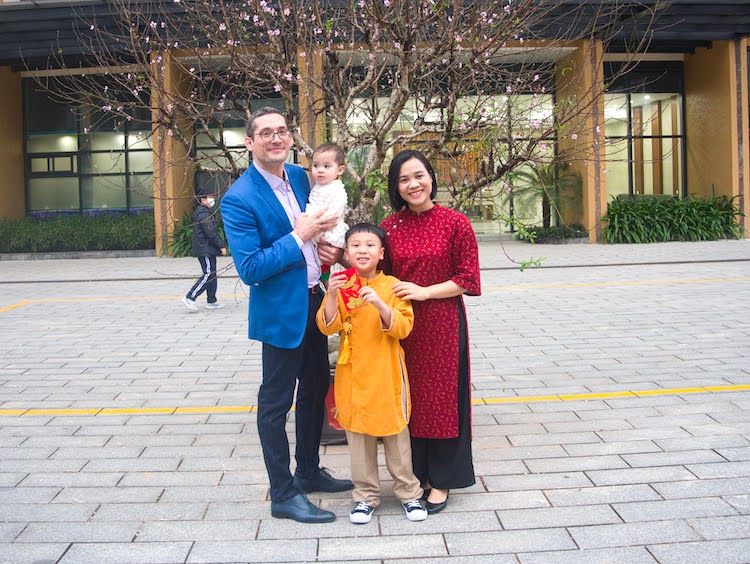Cutting red tape in APA approvals to speed up tax negotiations
The change in APA approval authority is expected to shorten processing time and enhance business proactiveness in international tax negotiations.




On the first days of lunar year 2022, TheLEADER had a talk with David Lapetina, Operations director of Tibco Software Vietnam about his life in Vietnam. The businessman has lived and worked in the country for more than ten years, and now has a happy family with a Vietnamese woman.
In the past two years, how has Covid-19 changed your work and life?
David Lapetina: As for everyone, the epidemic impacted my life a lot. First of all, working from home became a standard in the I.T. domains, although our activities allow us to do so much easier than in other industries.
It created a lot of impact in terms of management since it requires much more effort than before to keep the connection with people, and keep the team spirit alive. We had to be very imaginative to create online activities to keep people connected together, but also when onboarding newcomers to make them feel part of the company.
After all this period of alternating online and offline work, we can see that the epidemic reminded us how human relationships are what makes the strength of a company. We should never consider these relationships for granted, and we have to fight everyday to strengthen them.
So we can see that the epidemic changed the employment market with companies now accepting people working remotely, but also changed the way companies manage and interact with their employees. We will surely see more of its impact in the coming years.

Regarding my personal life, I was supposed to be in Paris at the beginning of April 2020 for the 50th wedding anniversary of my parents. At that time, Vietnam started to close the borders with Europe following the sudden surge in cases. So I faced the tough decision to attend the party and never be able to come back to Vietnam before long, or stay in Vietnam and miss the party.
I followed my instincts telling me the borders would not be closed for a few weeks only, and decided to stay in Vietnam. So, as of now, I have been unable to see my parents since the Summer 2019, and they have not yet met my daughter. Considering their age, it is a time that we will never be able to catch-up. Hopefully today’s technologies make the distance more endurable and we can do some video call to fill the void distance is creating.
The last point is that schools alternate also offline and online teaching. We end up with a kid who spends a lot of time in front of the screen which creates some emotional unbalance. Also, kids exchange a lot of games websites via chat that creates a lack of focus during class. Both kid and parents have more work to do during lockdown.
However, with patience, understanding and love, we overcome the difficulties. As for the consequences in my professional life, the epidemic forces us to find new opportunities to bond with our family and to never consider anything for granted.
Which Vietnamese culture in lunar new year do you find the most different and impressive? Can you share more about your unforgettable Tet memories in Vietnam?
David Lapetina: To me, Tet is very representative of the strong attachment of Vietnamese people to their family and their culture. We do not see such things in France. Of course, the period before Christmas and before Tet looks quite similar in terms of intense business activities and family meetings, but we can see that Tet has a deep meaning in the heart of every Vietnamese and this meaning, even after more than ten years, is difficult to grasp for a foreigner.
Last Tet, we had one ceremony in memory of my wife’s deceased grandmother. Because of traditions regarding death ceremonies, we were not able to go to the pagoda. With my wife, we just went in the small streets of the village, hearing the sounds of fireworks far away, and the wishes of the President of Vietnam for the new year through the windows of every house.
In regard to Vietnamese culture, I started to understand the contrast between death and the fact that Tet represents the end of winter, the spread of life everywhere in the fields.
Did you have culture shock when starting life in a new country? What were your first thoughts and feelings about Vietnam, such as people, traffic, or nature?
David Lapetina: I need to precise that I first came to Vietnam for work, and it changed a lot the way I discovered the country. I met very professional and competent people, so everything was pretty smooth.
Yes, the traffic is quite different from what we see in France, and also the culture, but I would not say that I found anything shocking. Of course, it is different, sometimes very different and sometimes very similar.

One example of difference happened during last Christmas. We had my parents in law at home and, as in France, during the night, I put all the gifts at the bottom of the tree for everyone. What I did not anticipate is that our nanny woke up at 5 am in the morning, and wanted to clean everything, so she put all the wrapped gifts together on the couch.
I remember hearing the noise of her cleaning and suddenly I realized I did not tell her beforehand, so I rushed to the living room but it was too late. It was easy to fix of course, and no harm done, but it shows how sometimes cultures collide.
What also helped me a lot is martial arts. For 13 years, I practice a martial art named Brazilian Jiu Jitsu which was not very trendy in Vietnam back in 2011, but shortly after I came, some Vietnameses started to practice in Hanoi. They created a gym named BJJ Hanoi. They were, and still are, very welcoming and eager to share.
So as you see my first contacts were mostly through work and sports, so it established a common language so helpful to overcome any challenges a cultural gap might have created.
Since I first arrived in 2011, I have visited Vietnam quite a lot and met wonderful people in such beautiful places that I dare not describe for fear of not finding the right words.
Why did you decide to develop your career in Vietnam, and then marry a Vietnamese women? How are cultural differences in the family resolved?
David Lapetina: Working in Vietnam made me consider that in terms of innovation, development, and economy, the future here is brighter in the long term than in Europe. We can see so many young entrepreneurs creating startups, students going to study Phd abroad and then coming back to support the development of their country. It is really something I like and at my modest scale contribute to.
That is why I am always willing to support students or young engineers in their personal developments.
Regarding getting married a Vietnamese woman, I have to say I come from a quite traditional family. Vietnamese women are hardworking and dedicated to their family. I really appreciate that so when I met my wife, we had a lot of common values.
Of course we sometimes have some cultural gap that can create challenges. As explained before, the key point is to find a common language, it can be technologies at work, sport or cooking.
I discovered that by sharing food we share much more than we could explain with words. So I cook some meals from Europe, like a Paella from Spain, some nice pasta in the Italian way or some French traditional dishes. My wife and the kids love it but also my parents in law.
Food is an immediate sensation that can be shared and enjoyed easily. I find it a great way of communicating.
Lastly, we need a lot of discussion and understanding, especially raising kids since we can find quite a difference between France and Vietnam on this topic. I believe the key is to never think that one culture is better than the other, and just consider these are different ways of providing to our kids what we all long for.
What all parents want is for their kid to be independent to make the right decisions, and have a good education, so they have the freedom of finding a good job in order to achieve happiness in their life.
Thank you a lot!
The change in APA approval authority is expected to shorten processing time and enhance business proactiveness in international tax negotiations.
As hybrid cloud systems grow more complex, Vietnamese enterprises are struggling to detect cybersecurity threats moving laterally within their own networks.
The submission of the draft resolution on Vietnam’s international financial center to the National Assembly heralds a new developmental era for the country.
More than just running a 5-star resort, Kristian Petersen is redefining the art of hospitality with a humane and sustainable leadership philosophy.
For Tyna Huynh, co-founder of Drinkizz, organic is not just a food choice but a way of life that fosters a deep connection between people, nature and community.
Embracing respectful workplaces could very well be the key to unlocking a more prosperous future for Vietnam's garment industry.